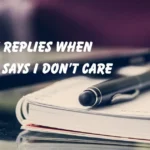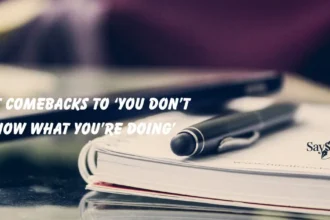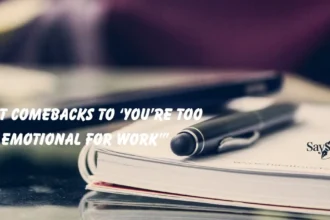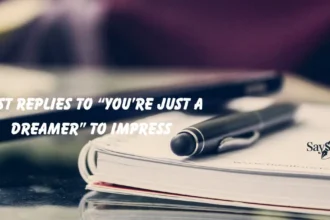Being called poor can feel like a sting, and it’s often meant as an insult. But don’t let that hurt you, it’s a perfect opportunity for a strong comeback. When someone tries to tear you down with a comment about your financial situation, you have the power to deflect that negativity with a witty response.
Sometimes, the best comebacks are brutal in their honesty, and they can turn the tables on the person who threw the jab. In this article, we’ll explore some clever ways to handle those moments and leave a lasting impression.
Why People Use Poor as an Insult
Being called poor can feel like a low blow, but the truth is, money doesn’t define your worth. Some people throw around this insult to feel superior, but a witty and brutal comeback can shut them down instantly. Whether they’re trying to mock your financial situation or just looking for a reaction, the best way to deflect the negativity is by staying confident and clever.
Instead of getting upset, turn the tables with a response that leaves them speechless. In this article, you’ll discover the smartest and boldest comebacks to handle these situations like a pro!
1. Enjoying Life Matters More Than Wealth
Story: Jake and Ryan are at a party when Ryan mocks Jake for not wearing expensive clothes. Instead of getting upset, Jake smiles and delivers this line with confidence.
When to Use: This is perfect when someone tries to shame you for not having luxury items or wealth. It works best in social settings where people value experiences over material things.
When Not to Use: Avoid using this with someone who genuinely wants to help or is discussing financial struggles in a serious way.
Example:
Ryan: “Man, you really need to upgrade your wardrobe.”
Jake: “It’s not about how much you have, but how much you enjoy what you’ve got.”
How to Respond 🗣️ Smile confidently and let them process your words. If they continue, just say, “I’d rather enjoy life than stress about impressing people.”
2. Wealth Comes in Many Forms
Story: Emma and Sarah are classmates. Sarah teases Emma about her old phone, but Emma stays calm and responds with this line.
When to Use: Use this when someone mocks your financial status, but you want to remind them that money isn’t the only thing that matters.
When Not to Use: Don’t say this in a heated argument. It works better when delivered casually with a smile.
Example:
Sarah: “Wow, you’re still using that phone?”
Emma: “Well, I guess some of us are rich in other things.”
How to Respond 🗣️ Keep your tone lighthearted and, if needed, add, “Like kindness, intelligence, and good vibes.”
3. Class is Priceless, Unlike Money

Story: Kevin is out with friends when Mike makes a rude comment about his simple outfit. Instead of getting offended, Kevin responds with this sharp comeback.
When to Use: This is best when someone tries to embarrass you for not wearing expensive clothes or accessories.
When Not to Use: Avoid using this in professional settings, as it may come across as confrontational.
Example:
Mike: “You dress so cheap. Ever heard of brands?”
Kevin: “I may not have a lot of money, but I’ve got more class than you’ll ever afford.”
How to Respond 🗣️ Say it with confidence and walk away. No further explanation is needed.
4. A Great Personality is Worth More
Story: Lily and Ben are talking at lunch when Ben laughs about Lily not having the latest sneakers. Lily shrugs it off and fires back with this response.
When to Use: Use this when someone tries to bring you down based on your financial status, but you want to flip it positively.
When Not to Use: Avoid this when the other person is joking harmlessly.
Example:
Ben: “Guess you couldn’t afford the new sneakers.”
Lily: “If being poor means having a great personality, then I guess I’m winning.”
How to Respond 🗣️ Keep it light and smile. If they keep going, add, “Personality lasts longer than shoes anyway.”
5. Manners Matter More Than Money
Story: David is out at dinner with a group when Chris loudly mocks his cheap phone case. David doesn’t lose his cool and delivers this smart line.
When to Use: Use this when someone with money is acting rude or entitled.
When Not to Use: Avoid saying this to someone who isn’t being intentionally mean.
Example:
Chris: “That phone case looks like it came from the dollar store.”
David: “Money can’t buy happiness, but it looks like it can buy bad manners.”
How to Respond 🗣️ Keep it classy. If needed, add, “I’d rather have a kind heart than an expensive phone case.”
6. Integrity is More Valuable Than Wealth
Story: Alex is discussing career goals with Tom when Tom makes a snide remark about Alex’s financial struggles. Instead of getting defensive, Alex responds wisely.
When to Use: Use this when someone tries to make you feel small for not having a lot of money.
When Not to Use: Don’t use this when someone is genuinely offering financial advice.
Example:
Tom: “You should focus on making money instead of dreaming.”
Alex: “I’d rather be poor with integrity than rich without it.”
How to Respond 🗣️ Stay calm and add, “Success without integrity isn’t real success.”
7. Happiness Doesn’t Depend on Money
Story: Mia is chatting with James when he comments on her modest lifestyle. Instead of feeling bad, Mia confidently replies.
When to Use: Use this when someone assumes money equals happiness.
When Not to Use: Avoid using it when someone is talking about financial struggles in a serious way.
Example:
James: “You must be unhappy living so simply.”
Mia: “Your opinion of my wealth is irrelevant to my happiness.”
How to Respond 🗣️ Say it with confidence and move on. If they insist, add, “Happiness isn’t for sale.”
8. Money Can’t Buy Manners
Story: Jason and Daniel are at a gathering when Daniel makes fun of Jason’s budget-friendly car. Jason remains unbothered and claps back with this line.
When to Use: Use this when someone rich acts entitled.
When Not to Use: Don’t use this when someone is simply discussing finances without bad intentions.
Example:
Daniel: “Your car is ancient. Get an upgrade!”
Jason: “I guess some people have more money than manners.”
How to Respond 🗣️ Say it smoothly and change the topic. If needed, add, “I value respect more than horsepower.”
Clever Replies to “May the Odds Be Ever in Your Favor”
9. Character is More Important Than Cash
Story: Olivia and Ethan are discussing life goals when Ethan laughs about Olivia’s small apartment. Olivia responds without hesitation.
When to Use: Use this when someone tries to measure your worth by your wealth.
When Not to Use: Avoid this when someone is having a serious financial discussion.
Example:
Ethan: “You live in that tiny place?”
Olivia: “I’d rather be poor in cash than poor in character.”
How to Respond 🗣️ Stay cool and say, “Character lasts longer than money ever will.”
10. Your Bank Balance Doesn’t Define You
Story: Mark and Jacob are at a café when Jacob jokes about Mark not being able to afford an expensive coffee. Mark responds smartly.
When to Use: Use this when someone tries to tie your worth to your wealth.
When Not to Use: Avoid this when discussing serious financial concerns.
Example:
Jacob: “Can’t even afford a fancy coffee?”
Mark: “My bank account doesn’t define my worth or character.”
How to Respond 🗣️ Keep your tone strong. If they continue, add, “I’d rather be rich in values than in money alone.”
11. Your Opinion Holds No Value

Story: Chris is showing off his new luxury watch and mocks Daniel for not having one. Instead of getting upset, Daniel delivers this sharp response.
When to Use: Use this when someone belittles you based on wealth but their opinion doesn’t hold weight.
When Not to Use: Avoid using this in professional settings or with someone offering genuine advice.
Example:
Chris: “Maybe if you had more money, you’d dress better.”
Daniel: “It’s funny how your opinion seems to be worth less than my bank balance.”
How to Respond 🗣️ Say it with confidence and move on. If they push further, add, “I don’t waste time on opinions that don’t matter.”
12. Money Can’t Buy a Real Personality
Story: Emily is at a gathering where Mia keeps bragging about her expensive designer clothes. When Mia mocks Emily’s simple outfit, she claps back.
When to Use: Use this when someone flaunts their wealth but lacks depth.
When Not to Use: Avoid this if someone is just discussing their lifestyle without putting others down.
Example:
Mia: “You should upgrade your wardrobe to look important.”
Emily: “At least I have a personality that doesn’t need to be bought.”
How to Respond 🗣️ Say it with a smile. If they keep going, add, “Confidence and character never go out of style.”
13. Wealth and Worth Are Not the Same
Story: Jake and Oliver are talking when Oliver laughs about Jake’s job. Instead of feeling bad, Jake delivers a powerful reply.
When to Use: Use this when someone assumes money is the only thing that makes a person valuable.
When Not to Use: Don’t use this when someone is discussing their hard work and achievements.
Example:
Oliver: “You’re still working that basic job?”
Jake: “It’s interesting how some people think wealth equals worth.”
How to Respond 🗣️ Keep it calm and, if needed, add, “Real worth is measured in actions, not bank accounts.”
14. Ignorance is Worse Than Being Broke
Story: Laura is at a dinner where Kevin makes fun of her budget travel plans. Instead of feeling embarrassed, she hits back with wisdom.
When to Use: Use this when someone thinks money is the only measure of intelligence.
When Not to Use: Avoid using this when someone is genuinely giving financial tips.
Example:
Kevin: “Only broke people travel on a budget.”
Laura: “I’d rather be poor in finances than rich in ignorance.”
How to Respond 🗣️ Say it confidently and change the topic. If they insist, add, “Wisdom lasts longer than wealth.”
Heartfelt Replies to Happy Mother’s Day Wishes
15. Money Can’t Buy Taste
Story: David and Nick are in a store when Nick mocks David’s affordable clothing choices. David doesn’t get offended and fires back.
When to Use: Use this when someone assumes expensive means stylish.
When Not to Use: Avoid using this if someone is just excited about their fashion choices.
Example:
Nick: “Your outfit screams budget shopping.”
David: “Money might buy things, but it doesn’t buy taste.”
How to Respond 🗣️ Say it casually. If they push back, add, “Style is about confidence, not price tags.”
16. Status Doesn’t Define Value
Story: Rachel and Lisa are chatting when Lisa makes a rude remark about Rachel’s old phone. Rachel stays unbothered and responds.
When to Use: Use this when someone assumes financial status determines a person’s importance.
When Not to Use: Avoid using this in serious financial discussions.
Example:
Lisa: “You should upgrade to a premium phone like mine.”
Rachel: “It’s cute how you think financial status determines a person’s value.”
How to Respond 🗣️ Say it lightly and change the subject. If needed, add, “People matter more than possessions.”
17. Kindness is More Valuable Than Cash

Story: Brian and Jason are at a coffee shop when Jason mocks Brian for tipping a waiter with small change. Brian responds gracefully.
When to Use: Use this when someone equates financial wealth with moral worth.
When Not to Use: Avoid saying this to someone who is struggling financially.
Example:
Jason: “That’s all you’re tipping? That’s embarrassing.”
Brian: “I’d rather be rich in kindness than in cash.”
How to Respond 🗣️ Say it sincerely. If they keep arguing, add, “A kind heart is priceless.”
18. A Good Heart is Priceless
Story: Ella is volunteering when her cousin Mark mocks her for spending time helping others instead of making money. Ella responds calmly.
When to Use: Use this when someone looks down on you for prioritizing kindness over wealth.
When Not to Use: Avoid using this if someone is genuinely struggling with financial issues.
Example:
Mark: “Why waste time volunteering when you could be making money?”
Ella: “If being poor means having a good heart, then I’m proud of it.”
How to Respond 🗣️ Say it confidently and continue what you’re doing. If they insist, add, “Some things matter more than money.”
19. Money Doesn’t Give You the Right to Judge
Story: Sam and Liam are at a party when Liam mocks Sam’s old car. Sam doesn’t get offended and responds wisely.
When to Use: Use this when someone with money acts like they have the right to criticize others.
When Not to Use: Don’t use this if someone is sharing their own financial experiences.
Example:
Liam: “I could never drive a car that old.”
Sam: “It’s funny how people with money think they have the right to judge.”
How to Respond 🗣️ Say it calmly. If they keep going, add, “A good attitude is worth more than a fancy car.”
20. Being Real is More Important Than Being Rich
Story: Noah and Ethan are talking when Ethan boasts about his expensive lifestyle and looks down on Noah. Noah doesn’t get intimidated.
When to Use: Use this when someone thinks wealth makes them superior.
When Not to Use: Avoid using this when someone is just excited about their success.
Example:
Ethan: “You should try to get rich like me.”
Noah: “I’d rather be poor and genuine than rich and fake.”
How to Respond 🗣️ Stay calm and smile. If they continue, add, “Real happiness comes from being yourself, not your wallet.”
21. Your Opinion Doesn’t Pay My Bills
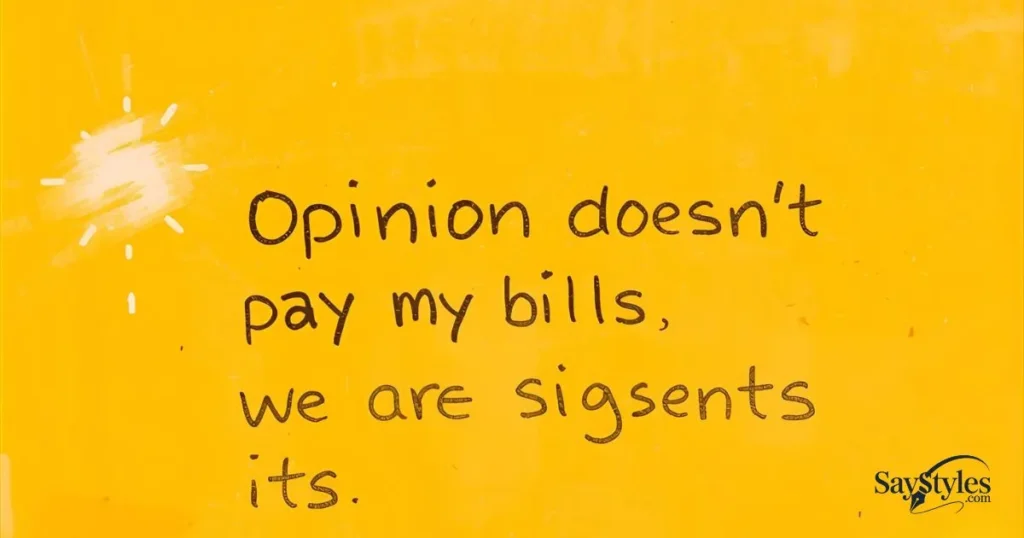
Story: Jake’s coworker, Tom, keeps making comments about how Jake should be making more money. Instead of letting it bother him, Jake shuts him down.
When to Use: When someone keeps questioning or criticizing your financial situation.
When Not to Use: If someone is genuinely trying to help with financial advice.
Example:
Tom: “You should really think about getting a better-paying job.”
Jake: “Your opinion about my finances doesn’t pay my bills or make me happier.”
How to Respond 🗣️ Say it with confidence. If they persist, add, “I focus on what truly matters in life.”
22. Money Can’t Buy True Value
Story: Sarah is talking to Amanda, who constantly brags about her designer outfits. When Amanda mocks Sarah’s simple dress, she calmly replies.
When to Use: When someone assumes wealth equals happiness or success.
When Not to Use: If the person is just excited about their financial achievements.
Example:
Amanda: “You’d look better in something more expensive.”
Sarah: “Money can’t buy the things that truly matter.”
How to Respond 🗣️ Say it casually. If they continue, add, “Character and kindness matter more than price tags.”
23. Wealth Doesn’t Define Me
Story: Chris is at a dinner where someone rudely comments on his financial status. Instead of feeling embarrassed, he flips the script.
When to Use: When someone belittles you for not being wealthy.
When Not to Use: If they’re just discussing their success without putting others down.
Example:
Rude Guest: “You should aim to be rich like me.”
Chris: “If being rich means being like you, I’ll stick with being poor.”
How to Respond 🗣️ Say it with a smirk. If they react, add, “Success isn’t just about money.”
24. A Clean Conscience is Priceless
Story: Emily is offered a shady business deal that could make her rich but at the cost of her morals. She declines with a powerful statement.
When to Use: When faced with a choice between money and integrity.
When Not to Use: If someone is discussing financial success earned honestly.
Example:
Shady Businessman: “You’d be rich if you just played the game.”
Emily: “I’d rather be poor with a good conscience than rich with a guilty one.”
How to Respond 🗣️ Stay firm. If they pressure you, add, “Some things are worth more than money.”
25. Self-Respect is Priceless
Story: Mike is talking to an old friend who constantly flaunts his wealth. When the friend tries to make him feel bad, Mike stands his ground.
When to Use: When someone tries to make you feel inferior for not being rich.
When Not to Use: If they are just talking about their financial journey.
Example:
Rich Friend: “You should focus on making real money.”
Mike: “I may not have a lot of money, but I have something that’s priceless: self-respect.”
How to Respond 🗣️ Say it confidently. If they argue, add, “Respect is something money can’t buy.”
26. An Empty Insult for an Empty Wallet
Story: Lisa is getting teased by her classmate for not having the latest gadgets. She doesn’t let it affect her.
When to Use: When someone mocks you for not having money.
When Not to Use: If they’re just sharing their excitement about their purchases.
Example:
Classmate: “Wow, your phone is ancient.”
Lisa: “Your comment is as empty as my wallet.”
How to Respond 🗣️ Say it playfully. If they push, add, “At least I don’t need a new phone to feel important.”
27. Happiness Over Wealth
Story: Kevin is working a simple job that he enjoys. A relative keeps telling him to chase money instead. He shuts down the negativity.
When to Use: When someone assumes wealth equals happiness.
When Not to Use: If they’re offering genuine career advice.
Example:
Relative: “You could be making way more money.”
Kevin: “I’d rather be poor and happy than rich and miserable.”
How to Respond 🗣️ Say it warmly. If they argue, add, “Happiness isn’t measured in dollars.”
28. A Bank Account vs. an Ego
Story: Ryan is hanging out with a wealthy acquaintance who keeps showing off. He makes a witty remark to bring them back to reality.
When to Use: When someone brags excessively about their money.
When Not to Use: If they’re just celebrating their success without being arrogant.
Example:
Wealthy Acquaintance: “I make six figures, you should try it.”
Ryan: “If my bank account were as full as your ego, I’d be rich.”
How to Respond 🗣️ Say it with a smile. If they get defensive, change the subject.
29. Money Can’t Make You a Good Person
Story: Olivia is listening to someone belittle others just because they are wealthy. She calls them out.
When to Use: When someone acts superior just because they have money.
When Not to Use: If they are simply discussing finances.
Example:
Arrogant Person: “People without money are just lazy.”
Olivia: “Money doesn’t make a person better, but it seems it can make some people worse.”
How to Respond 🗣️ Say it firmly. If they keep going, add, “A good heart is worth more than a fat wallet.”
30. A Life Without Negativity is Priceless
Story: Anna is dealing with a toxic coworker who constantly brags about their wealth and puts others down. She finally speaks up.
When to Use: When someone’s negativity is tied to their wealth.
When Not to Use: If they’re not being intentionally rude.
Example:
Toxic Coworker: “You wouldn’t understand luxury living.”
Anna: “If being poor means not having to deal with your attitude, I’ll take it.”
How to Respond 🗣️ Say it lightly. If they keep going, add, “I prefer good company over expensive things.”
31. Rich in Love, Not Just in Money
Story: Mark is at a reunion where an old classmate keeps flaunting his expensive lifestyle. When asked about his financial status, Mark responds confidently.
When to Use: When someone implies that money is the only way to measure success.
When Not to Use: If they are just happy about their financial achievements.
Example:
Classmate: “You’re still living in that small house?”
Mark: “I may not be rich in money, but I’m rich in love and happiness.”
How to Respond 🗣️ Say it proudly. If they push further, add, “Success isn’t just about a paycheck.”
32. Character Over Cash
Story: Lisa is chatting with a distant relative who keeps talking about how wealthy people are superior. She quickly reminds them of what truly matters.
When to Use: When someone assumes wealth makes them morally or socially superior.
When Not to Use: If they’re just discussing finances respectfully.
Example:
Relative: “Wealthy people have more class.”
Lisa: “I’d rather be rich in character than in cash.”
How to Respond 🗣️ Say it calmly. If they insist, add, “True value isn’t in a bank account.”
33. Your Money, Your Business—Not Mine

Story: Ethan’s colleague constantly brags about his latest purchases and questions Ethan’s spending habits. Ethan decides to set the boundary.
When to Use: When someone is nosy about your finances.
When Not to Use: If they’re offering friendly financial advice.
Example:
Colleague: “Why don’t you buy a better car?”
Ethan: “My money, my choices—just like your money is your business.”
How to Respond 🗣️ Say it lightly but firmly. If they persist, add, “I prioritize what matters to me.”
34. A Simple Life is a Happy Life
Story: Olivia’s friends keep pressuring her to chase wealth at the cost of her peace. She stands her ground.
When to Use: When people push you to value money over peace of mind.
When Not to Use: If they’re simply discussing career growth.
Example:
Friend: “You should hustle harder to get rich.”
Olivia: “A simple life with peace is better than a rich life with stress.”
How to Respond 🗣️ Say it confidently. If they question it, add, “Happiness isn’t measured in dollars.”
35. Net Worth ≠ Self-Worth
Story: Michael is surrounded by people who constantly compare their wealth. He reminds them that money isn’t everything.
When to Use: When someone ties self-worth directly to money.
When Not to Use: If they’re just celebrating financial achievements.
Example:
Wealthy Acquaintance: “A person’s worth is shown in their bank account.”
Michael: “Net worth and self-worth aren’t the same thing.”
How to Respond 🗣️ Say it seriously. If they argue, add, “People are worth more than numbers.”
Top Editor’s Choice Responses
- It’s not about how much you have, but how much you enjoy what you’ve got.
- Well, I guess some of us are rich in other things.
- I may not have a lot of money, but I’ve got more class than you’ll ever afford.
- If being poor means having a great personality, then I guess I’m winning.
- Money can’t buy happiness, but it looks like it can buy bad manners.
- I’d rather be poor with integrity than rich without it.
- Your opinion of my wealth is irrelevant to my happiness.
- I guess some people have more money than manners.
- I’d rather be poor in cash than poor in character.
- My bank account doesn’t define my worth or character.
- It’s funny how your opinion seems to be worth less than my bank balance.
- At least I have a personality that doesn’t need to be bought.
- It’s interesting how some people think wealth equals worth.
- I’d rather be poor in finances than rich in ignorance.
- Money might buy things, but it doesn’t buy taste.
- It’s cute how you think financial status determines a person’s value.
- I’d rather be rich in kindness than in cash.
- If being poor means having a good heart, then I’m proud of it.
- It’s funny how people with money think they have the right to judge.
- I’d rather be poor and genuine than rich and fake.
Conclusion
At the end of the day, money doesn’t define a person—character, values, and happiness do. A wealthy heart is more valuable than a wealthy wallet. Whether you’re dealing with arrogant people, judgmental comments, or constant pressure to chase money, these responses help shut down negativity with confidence.
Your success isn’t measured by your bank balance, but by the life you build. Choose kindness, happiness, and self-respect over empty wealth. After all, the richest people aren’t always the ones with the most money—they’re the ones who are truly fulfilled.

I’m Lily Hart, the Admin behind the engaging responses at SayStyles.com! With a knack for blending wit and warmth, I turn every piece of writing into something memorable. From clever advice to fun comebacks, I’m here to make sure every response leaves you smiling and thinking.


